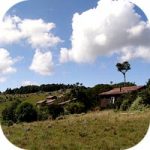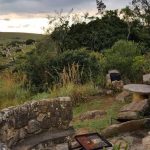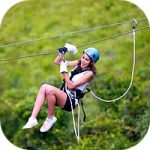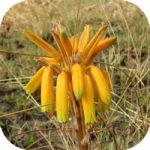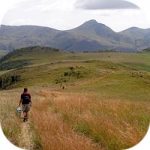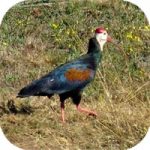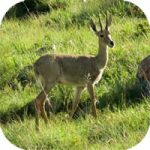Malolotja National Park is Swaziland’s largest highveld reserve, and a transfrontier park. This scenic mountain wilderness is home to floral endemics and endangered species, is a hiker’s paradise. Ideal for groups, families, outdoor adventure market, campers and backpackers and the nature lovers.
Malolotja National Park covers 18,000ha (44,000 acres) of mountain wilderness on Eswatini’s northwestern border with South Africa. The park consists of Ngwenya Mountain, Eswatini’s second highest mountain (1,829 m), and Malolotja Falls which drop 89 metres (292 ft), the highest in Eswatini. The habitats include short grassland to thick riverine scrub, bushveld and Afromontane forest.
Accommodation
Malolotja provides 10 self-catering cabins, fully equipped, including bedding and towels. Two cabins accommodate five people in each (two bedrooms, one with two single beds, one with a single and a bunk bed), the rest accommodating 4 people in each (two bedrooms with two single beds in each).
Restaurant
There is a restaurant and bar situated next to the cabins, open from 8.00 am to 4.00 pm for breakfast and light meals. The restaurant seats 150. Lunch and dinner’s are available a la carte, or buffet for groups. A breakfast buffet is also available as well as cooked breakfast a la carte. Children’s meals are at half price (from ages 5 to 11).
Campsite
The main campsite at Malolotja Park includes 14 sites (which accommodate 1 to 2tents, bring your own tent) each with braai facilities, ablution block with hot water, showers and baths, also a communal braai area . There is no electricity, some sites are fitting for caravans, fine for motor homes.
For the hikers, there are 19 backpacking camps, each one consisting of a clearing situated near water.
Tree Top Canopy Tour
Visitors can experience the thrill of gliding through the forest canopy within Malolotja Nature Reserve, the last mountain wilderness area in Swaziland. The canopy tour provides views of towering cliff faces and across the forest.
Flora
One of Malolotja’s greatest attractions is undoubtedly its flora. Throughout the year the types and profusion of wild flowers provides a magnificent spectacle. Several species of plants that are restricted for the most part to the Barberton greenstone belt of southern Africa, are also found growing in Malolotja. Some of the more important threatened species are the cycads, of which 2 species occur within the reserve. A visit in spring offers the opportunity to see the diverse show of spring flowers. Also of particular interest are the orchids, grassland aloes and streptocarpus species.
Aloe chortolirioides
Hiking
Malolotja offers a diverse range of hiking opportunities, varying from short walks to overnight trails taking advantage of the network of over 200 kms of hiking trails and 17 backpacking camps. Seven days trail could encompass all areas of the park.
Birdwatching
Malolotja Nature Reserve offers a diverse range of highveld and middleveld species, including birds such as the blue swallow, striped flufftail, bald ibis, black rumped buttonquail and many other interesting species.
Bald Ibis
Other activities available include:
- Game drives.
- Guided tour of Ngwenya Mine and Lion Cavern
- Mountain biking
- Fishing: Forbes Reef dam and Hawane Dam
- Horse Riding: At Hawane Stables, about 15 km from the Malolotja Entrance Gate.
Malolotja offers protected wetland, woodland, highveld grassland and mistbelt forest habitats for a wide variety of plant and animal life. If this were to be measured in relation to the number of southern African endemic species of animals occurring in the reserve, then Malolotja Reserve must surely stand out as one of the most important protected areas in southern Africa. The reserve provides the opportunity to see animals such as eland, oribi, grey rhebok and aardwolf. The diverse fauna covers several regionally important and rare species including the Swazi Thick-tailed Rock Gecko, the Barberton Girdled Lizard and the Swazi Rock Snake. There is a huge diversity of invertebrates, including more than 150 species of butterflies.

